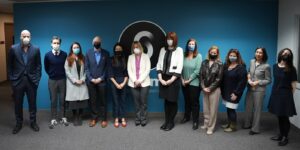NCTO and Regional Associations Host Under Secretary of State Jose Fernandez at Industry Roundtable in Honduras
WASHINGTON – The National Council of Textile Organizations (NCTO) in conjunction with regional textile industry associations, hosted Jose Fernandez, Under Secretary of State for Economic Growth, Energy and the Environment, at an industry roundtable in Tegucigalpa, Honduras today.
The meeting brought together U.S. and Central American textile and apparel executives and investors to discuss trade policy priorities that support economic development in the region and bolster a co-production chain that supports more than 1 million textile and apparel workers.
The Under Secretary’s visit with leading apparel and textile manufacturing companies in the U.S. and across the region comes at a critical time, when the global supply chain has broken down and demand for ethical and sustainable sourcing is growing, presenting new opportunities for significant growth and expansion to the Western Hemisphere and out of Asia.
Textile and apparel executives with a significant stake in this co-production partnership, as a result of the Dominican Republic-Central America Free Trade Agreement (CAFTA-DR), held a roundtable discussion highlighting the need for policies that continue to support the onshoring and nearshoring of this critical supply chain, which has spurred significant job growth and economic development in the region and the United States.
Hundreds of millions of dollars of investments have been flowing into Central America, predicated on the U.S.-CAFTA-DR agreement and the co-production chain that facilitates $12.5 billion in two-way textile and apparel trade.
U.S. textile companies have made billions of dollars in investments with historic investments being made this year. The most recent comes from Gastonia, N.C.-based Parkdale Mills, the largest U.S producer of cotton spun yarn, which announced a $150 million investment in a new yarn spinning facility in Honduras in December and a substantial investment to support existing operations in Hillsville, Virginia, which will create and support 500 jobs in the two countries.
Earlier this week, ThinkHUGE publicly announced nearly $350 million in textile investments in the region, in addition to $680 million of investments in renewable energy production to further sustain this critical supply chain.
NCTO President and CEO Kim Glas said, “We sincerely appreciate Under Secretary Fernandez’s visit and discussion with textile and apparel companies today in Honduras, which underscores the Biden administration’s commitment to this critical manufacturing sector that has formed the backbone of economic development in Central America. The U.S. textile industry has invested over $20 billion dollars in the U.S. and billions more in the hemisphere over the last decade to grow economic opportunities in the U.S. and in the region.”
Glas continued, “In the midst of an ongoing global health crisis, the U.S. and Central American co-production chain continues to make sustainable investments that strengthen supply chain resilience; creates job opportunities and investment in the U.S. and the region; and mitigates the environmental and labor impact linked to Asian supply chains, as momentum grows for onshoring and nearshoring textile and apparel production.”
“This is an exciting time for the U.S. textile industry and that in the region, which is experiencing a strong rebound from COVID-19, as more public investments have been announced and will be announced throughout the year. We are delighted to host Under Secretary Fernandez and appreciate the administration’s engagement and support for our collective industries.”
###
NCTO is a Washington, DC-based trade association that represents domestic textile manufacturers.
- U.S. employment in the textile supply chain was 530,000 in 2020.
- The value of shipments for U.S. textiles and apparel was $64.4 billion in 2020.
- U.S. exports of fiber, textiles and apparel were $25.4 billion in 2020.
- Capital expenditures for textiles and apparel production totaled $2.38 billion in 2019, the last year for which data is available.
CONTACT:
Kristi Ellis
Vice President, Communications
National Council of Textile Organizations
kellis@ncto.org | 202.684.3091

 U.S. Trade Representative Sarah Bianchi made an inaugural trip to meet with U.S. textile manufacturers in the New England area in late February, where she toured Shawmut Corp.’s state-of-the-art manufacturing facility in West Bridgewater, Mass. and participated in a substantive textile industry roundtable discussion with NCTO member executives.
U.S. Trade Representative Sarah Bianchi made an inaugural trip to meet with U.S. textile manufacturers in the New England area in late February, where she toured Shawmut Corp.’s state-of-the-art manufacturing facility in West Bridgewater, Mass. and participated in a substantive textile industry roundtable discussion with NCTO member executives.